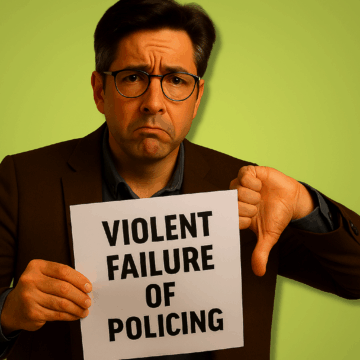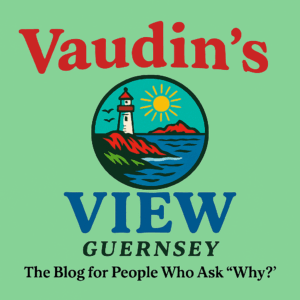
The Police State Comes to Paradise: Why Kitchen’s “Vision” Should Terrify Every Islander
September 12, 2025 – Marcus Vaudin
While the local media fawns over our new Chief of Police and his shiny three-year plan, I’m asking the questions nobody else seems willing to ask: Do we really want to transform Guernsey into a surveillance state? And why is nobody talking about what “investing in technology” actually means for our civil liberties?
Chief Officer Damian Kitchen’s Strategic Delivery Plan reads like a dystopian playbook wrapped in community-friendly language. Behind the warm words about “neighbourhood policing” and “community engagement” lies a fundamental shift toward what I can only describe as the militarisation of island life.
The Five Pillars of Control
Let’s decode what Kitchen’s five pillars really mean:
“Neighbourhood policing and community engagement” – Translation: More officers embedded in your daily life, building profiles on residents, encouraging neighbours to report on each other. This isn’t community policing; it’s community surveillance.
“Putting victims first” – Sounds noble until you realise this often means bypassing due process, presuming guilt, and creating a two-tier justice system where accusation equals conviction.
“Public safety” – The oldest excuse in the authoritarian playbook. How much freedom are we willing to surrender for the illusion of safety? Benjamin Franklin had something to say about this trade-off.
“Bringing offenders to justice” – In an era where simply expressing the wrong opinion online can make you an “offender,” this phrase should chill every thinking person.
“Highest standards of policing” – Whose standards? By whose definition? This is meaningless corporate speak designed to shut down criticism.
The Technology Trap
Here’s where it gets truly sinister. Kitchen admits that “There’s nothing that we deal with that doesn’t have a technological footprint on it.” Think about that statement. EVERYTHING has a technological footprint now. Your phone, your car, your shopping habits, your social media posts, your streaming choices, your heating system.
When a police chief says he needs to “invest more in technology and training” to deal with this reality, he’s essentially saying he wants access to every aspect of your digital life. Facial recognition cameras? Digital monitoring systems? Social media surveillance? AI-powered predictive policing that flags you as suspicious before you’ve done anything wrong?
This isn’t about catching criminals anymore – it’s about creating a panopticon where every islander is potentially suspect.
The Cost of Compliance
Kitchen casually mentions that staying ahead of technological crime “does cost money.” But he’s not just talking about financial costs. He’s talking about the cost to our way of life, our privacy, our fundamental assumptions about what it means to live in a free society.
We’re being asked to fund our own oppression, and most people are too distracted by fears of antisocial behaviour and road traffic accidents to see what’s really happening.
Manufactured Consent
Notice how this plan appeared fully formed, without genuine community consultation. We’re presented with a fait accompli and told it’s for our own good. The classic technique of manufactured consent – create the perception of public participation while ensuring the outcome was predetermined.
The emphasis on “measurable outcomes” and “community feedback” isn’t about accountability – it’s about gaming the metrics to justify whatever expansion of powers they want next. Lower crime statistics can be achieved by changing what gets recorded as crime. Positive community feedback can be manufactured through selective polling and media manipulation.
The Real Questions Nobody’s Asking
Why did we need a police chief from off-island to tell us how to police our own community? What’s wrong with traditional Guernsey approaches to dealing with problems? Why are we importing mainland authoritarianism when our crime rates are already among the lowest in the world?
And most importantly: Why is a community of 60,000 people being policed like we’re a major metropolitan area with serious organised crime problems?
The Slippery Slope
This three-year plan isn’t an endpoint – it’s phase one. Once you accept the principle that technology-enhanced surveillance policing is necessary, where does it end? Predictive algorithms determining who gets stopped and searched? Social credit systems determining who gets services? Digital ID requirements for basic transactions?
The infrastructure being built now will outlast Kitchen’s tenure. The precedents being set will be used by whoever comes after. And once these powers exist, they’re never voluntarily given up.
What We Should Demand Instead
Real community safety comes from strong communities, not strong surveillance states. We should be talking about:
- Community mediation services instead of criminalization
- Youth programs that give young people purpose instead of monitoring systems that track their every move
- Mental health support instead of punishment-first approaches
- Transparency and accountability instead of “trust us, we’re professionals”
Wake Up, Guernsey
This isn’t about being anti-police or pro-crime. It’s about recognizing that the cure can be worse than the disease. We’re being asked to sacrifice the very freedoms that make Guernsey special in the name of protecting them.
Kitchen’s plan might sound reasonable on the surface, but scratch beneath and you’ll find the blueprint for transforming our island home into just another surveilled, regulated, controlled modern society where your every move is monitored, recorded, and analyzed.
The question isn’t whether we can afford to fund this transformation. The question is whether we can afford not to resist it.
The choice is still ours – but not for much longer.
Marcus Vaudin refuses to be silenced by the forces of creeping authoritarianism. Support independent voices while you still can.
Discover more from Guernsey Deep Dive
Subscribe to get the latest posts sent to your email.








